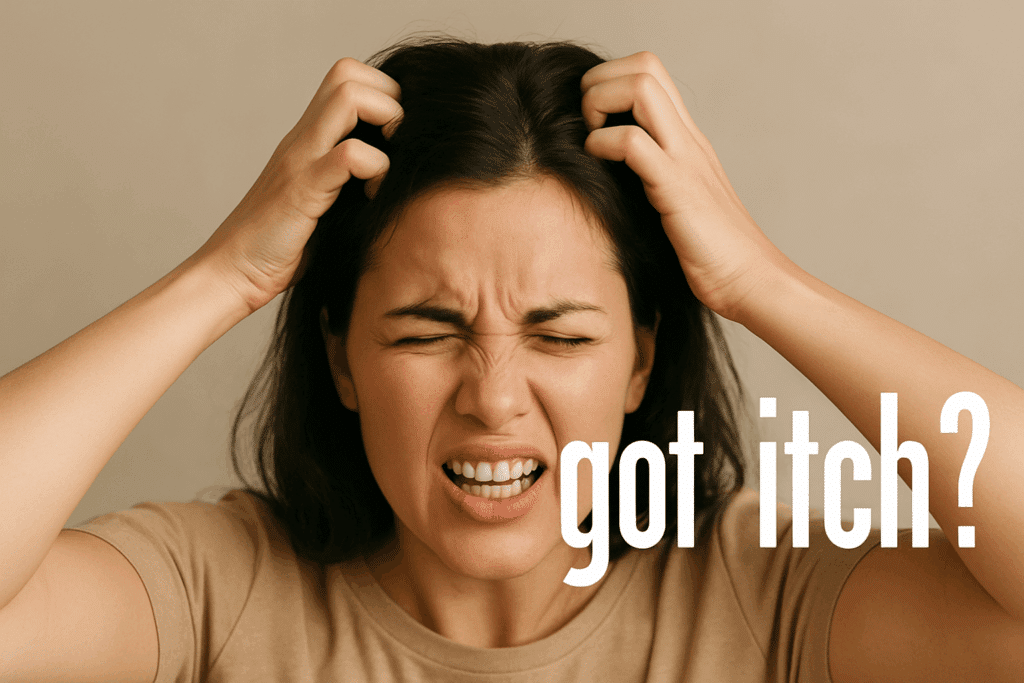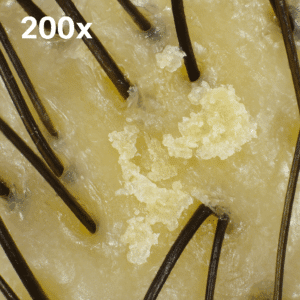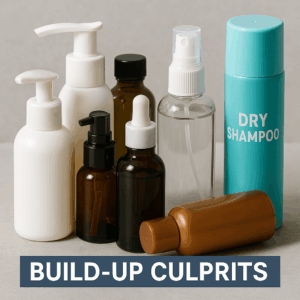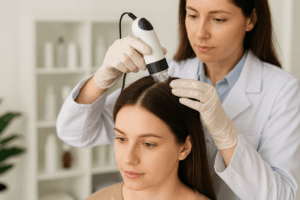
Got Itchy Scalp? It Might Not Be What You Think
Think it’s dryness or dandruff? The real culprit is likely excess oil—and your current routine may actually be making it worse.
If your scalp itches, your first thought is probably, “It must be dry.”
You might reach for conditioner, scalp oils, or even Head & Shoulders—only to find it gets worse.
Here’s the thing: most itchy scalps aren’t dry. They’re oily.
And that “itch” you’re feeling? It’s often inflammation from oil buildup—not a lack of moisture. As trichologists, we see this every day. Understanding the real cause is the first step toward relief.
Get Answers With a ScalpCheck®
If you’re dealing with itch, flakes, oiliness, or irritation, guessing won’t fix it —
but a ScalpCheck® will. During this in-depth microscopic evaluation, our trichologist examines:
- Sebum (oil) levels — too high or too low
- Follicle congestion & buildup
- Signs of inflammation or yeast
- Your scalp’s moisture, pH, and overall health
You’ll leave with a clear diagnosis and a customized scalp care plan designed specifically for
your symptoms — finally knowing what’s really going on.
Myth Busted: Itchy ≠ Dry
It’s easy to associate itchiness with dryness—especially in the winter. But your scalp isn’t like the skin on your arms or legs. When your hair feels dry from color, heat, or damage, many assume their scalp must be dry too.
That’s a huge misconception.
In reality, itchiness is usually caused by too much oil, not too little.
What’s Really Causing the Itch?

When the scalp overproduces oil (sebum), it mixes with:
- Dead skin cells
- Sweat
- Leftover product
- Yeast or bacteria that thrive in oily environments
This creates inflammation and itchiness — and can eventually lead to oily dandruff, seborrheic dermatitis, or even hair loss.
Why Is My Scalp Producing So Much Oil?
1. Hormonal Changes
Puberty, pregnancy, perimenopause, or androgen shifts all increase sebum production.
2. Chronic Stress
Stress stimulates oil glands through the HPA axis.
3. Medications
Testosterone therapy, certain birth control pills, antidepressants, antiepileptics, and other medications can increase oil production.
4. The Shampooing Myth
“Does washing your hair more cause more oil?”
Not really.
The bigger problem is using the wrong product—especially harsh detergents. And more commonly, people simply aren’t washing often enough.
Are Your Products Making It Worse? (Spoiler: Probably.)
1. Conditioner on the Scalp
Conditioner is for hair, not scalp. Applying it to your roots traps oil, clogs follicles, and worsens inflammation.
2. DIY Oil Treatments
Oils like rosemary, castor, and coconut may help some—but not all. For oily scalps, these often:
- Feed yeast
- Cause buildup
- Increase itch
3. Product Layering
Dry shampoos, serums, leave-ins… they build up fast. Without regular cleansing, your scalp ends up covered in residue and grime.

Dry Shampoo: The Worst Offender in Disguise
Dry shampoo doesn’t clean your scalp—it just absorbs surface oil and leaves behind residue.
It’s like spraying deodorant over body odor—it masks the issue but never solves it.
Over time, this buildup:
- Clogs follicles
- Traps bacteria and yeast
- Causes itch and inflammation
- Delays real cleansing
Dry shampoo is no substitute for real cleansing—and it’s one of the biggest contributors to itchy scalp issues.
Most People Aren’t Shampooing Correctly—Are You?
Even with the right product, technique matters. Common mistakes:
- Not emulsifying the shampoo first (apply to your hands, not straight on your scalp)
- Using too much—or too little
- Not applying thoroughly, especially at the nape
- Skipping the second wash when needed
We recommend shampooing daily or every other day with a mild, scalp-friendly cleanser. And always keep conditioner off the scalp.

How a Trichologist Can Help
We don’t guess—we assess.
At our center, a trichologist will:
- Examine your scalp under magnification
- Identify sebum levels, buildup, and inflammation
- Look for signs of microbial imbalance (yeast, bacteria)
- Customize a treatment plan tailored to your scalp’s unique needs
From there, we create a scalp care plan built specifically for you – to finally stop the itch, regulate the oil, and bring your scalp back to balance.
The Bottom Line
Itchy scalp isn’t random—and it’s not always dandruff or dryness. For most people, the root cause is too much oil and improper scalp care.
And the fix? It’s not in another over-the-counter shampoo.
It starts with real answers.
Ready to Understand What’s Really Going On With Your Scalp?
You now have two ways to move forward:
- ScalpCheck® – our in-depth microscopic scalp evaluation (ideal if you’re dealing with itch, flakes, or oil imbalance).
- Hair Solution Consultation – if you’re also noticing thinning or seeing more scalp than hair.
Your scalp symptoms tell a story — we help you finally understand it.
{
“@context”: “https://schema.org”,
“@type”: “Article”,
“headline”: “Got Itchy Scalp? It Might Not Be What You Think”,
“description”: “Most itchy scalps aren’t dry—they’re oily. Learn the real cause of scalp itch, why oil imbalance matters, and how a ScalpCheck® or Hair Solution Consultation can give you answers.”,
“author”: {
“@type”: “Organization”,
“name”: “Jeffrey Paul’s Hair & Scalp Specialists”
},
“publisher”: {
“@type”: “Organization”,
“name”: “Jeffrey Paul’s Hair & Scalp Specialists”,
“logo”: {
“@type”: “ImageObject”,
“url”: “https://www.hairscalp.com/wp-content/uploads/2023/05/JP-Logo-Blue.png”
}
},
“mainEntityOfPage”: {
“@type”: “WebPage”,
“@id”: “https://www.hairscalp.com/why-is-my-scalp-so-itchy/”
}
}
{
“@context”: “https://schema.org”,
“@type”: “FAQPage”,
“mainEntity”: [
{
“@type”: “Question”,
“name”: “Why does my scalp itch?”,
“acceptedAnswer”: {
“@type”: “Answer”,
“text”: “Most itchy scalps are caused by excess oil (sebum) mixing with dead skin, sweat, and product buildup—not dryness. This leads to inflammation and itchiness, and can sometimes contribute to dandruff or hair thinning.”
}
},
{
“@type”: “Question”,
“name”: “Does dry scalp cause itching?”,
“acceptedAnswer”: {
“@type”: “Answer”,
“text”: “Dry scalp can cause some discomfort, but most persistent itching comes from oil imbalance or buildup rather than dehydration of the scalp. That is why simply adding oils or heavy conditioners often makes the problem worse.”
}
},
{
“@type”: “Question”,
“name”: “Can an oily scalp cause hair loss?”,
“acceptedAnswer”: {
“@type”: “Answer”,
“text”: “Yes. Excess oil can clog follicles, feed yeast, trigger inflammation, and contribute to seborrheic dermatitis or oily dandruff. Over time, this unhealthy environment can weaken the follicle and be associated with hair thinning.”
}
},
{
“@type”: “Question”,
“name”: “How do I know if I need a ScalpCheck?”,
“acceptedAnswer”: {
“@type”: “Answer”,
“text”: “If you have ongoing itch, flakes, redness, oil imbalance, or you are unsure what is causing your scalp symptoms, a ScalpCheck provides microscopic analysis and a personalized scalp care plan so you know exactly what is happening.”
}
}
]
}
